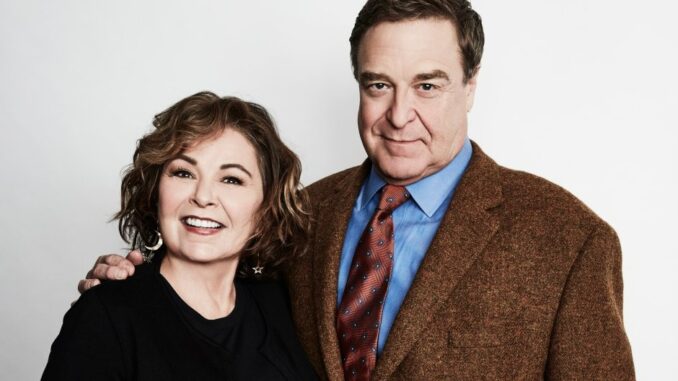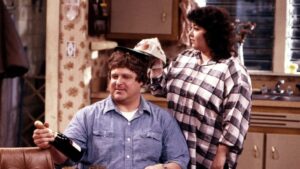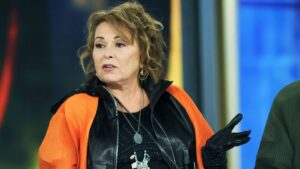
The decision to axe the hit sitcom revival ends debates over the off-screen bigotry shown by its star, Roseanne Barr
ABC’s decision to cancel Roseanne – after its eponymous star compared Valerie Jarrett, a black former adviser to Barack Obama, to an ape – sent rumbles through the entertainment industry. Barr’s tweet, in which she also “joked” that Jarrett had ties to the Muslim Brotherhood, caused a public outcry, resulting in swift condemnations of Barr from her own cast mates and, ultimately, the network’s unprecedented decision to pull the plug on its ratings juggernaut just one week after its season finale.
Roseanne Barr
Roseanne cancelled: ABC scraps sitcom after star’s ‘abhorrent’ tweets

In a statement made hours after Barr’s tweets, which quickly prompted calls for the network to discipline her, ABC Entertainment president Channing Dungey called Roseanne’s post “abhorrent, repugnant and inconsistent with our values”, announcing the sitcom would be cancelled. In a tweet, Disney CEO Bob Iger echoed Dungey’s statement and said: “There was only one thing to do here, and that was the right thing.” Jarrett, who on Tuesday night will serendipitously appear in an MSNBC town hall called “Everyday Racism in America”, called Barr’s comments a “teaching moment”.
The network’s cancellation marks something of a denouement to Barr’s rapid return to the public eye and subsequent fall from grace. It was only a few months ago that Roseanne, which went on a two-decade hiatus before ABC revived the series for a 10th season, earned Donald Trump’s seal of approval following its season premiere, which, with 18 million viewers, was television’s highest-rated comedy telecast in almost four years.
Barr, a vocal supporter of Trump’s who in February told ABC “we’re lucky to have him as a president”, reportedly even received a congratulatory call from him after the season premiere. Aside from its colossal viewership, critical accolades followed the reboot, too. Roseanne was praised for having its finger on the political pulse and harnessing the appeal of the original series, which Barr herself once called “television’s first feminist and working-class sitcom”.
Indeed, the show’s embrace by the political right reflected just how radically its star had changed her tune since the ninth season finale aired in 1997. “I wrote on the original Roseanne where we used to denounce nativism, racism & homophobia,” Danny Zuker, the executive producer of ABC’s Modern Family, wrote on Twitter Tuesday. “Nauseating to see what she’s become.”
Roseanne Barr and John Goodman.

Roseanne Barr and John Goodman.
In spite of the revival’s popularity, accusations of racism and insensitivity continued to trail Barr, whose on-screen alter ego Roseanne Connor plays a working-class Trump supporter (“He talked about jobs – he said he’d shake things up”) at odds with her liberal sister Jackie and struggling with an addiction to prescription drugs. In an episode that aired earlier this month, for instance, Roseanne suspects her Muslim neighbor is building a bomb, saying they’re probably from “Talibanjistan”. Predictably, the episode was roundly criticized as Islamophobic, a charge Barr responded to on her social media platform of choice.
“I like to do TV episodes about REAL ISSUES & REAL PEOPLE,” she wrote. “That’s what I do. Next season will be even more current events-I will challenge every sacred cow in USA.”
There was also pushback to an apparent dig made by Roseanne’s character at two racially diverse ABC programs, black-ish and Fresh Off the Boat. In one episode Dan, Roseanne’s on-screen husband, says that the couple slept through “all the shows about black and Asian families,” to which Roseanne sarcastically replies, “They’re just like us!”
Roseanne and her on-screen husband John Goodman. it seems clear that the show itself will never be exactly non-partisan.
Cold comfort: how the Roseanne revival portrayed a bleak America
Read more
Although the show rarely invoked Trump after its premiere, making only cursory references to contemporary hot-button topics like gender fluidity and national anthem protests, its erstwhile star has a pattern of trafficking in the same kinds of culture wars and conspiracies as the president. Barr’s tweet about Jarrett was not even the first time she’d compared a black female Obama official to an ape: in a since-deleted tweet from 2013, she called former national security adviser Susan Rice a “man with big swinging ape balls”.
Barr’s also tweeted about “Pizzagate” and the murder of DNC staffer Seth Rich; falsely claimed Chelsea Clinton was married to a nephew of George Soros; and called Hillary Clinton an “anti-Semite” and Huma Abedin a “filthy nazi whore”. In March, she said Trump “has freed so many children held in bondage to pimps all over this world”, parroting a rightwing conspiracy about pedophilic
, Hollywood-controlled sex rings.
And when Barr ran for president as a representative of the Peace and Freedom party, she wrote a letter to Congress citing the Boston Marathon bombing as an example of the Obama administration “contriving false flag terror attacks to remove the second amendment”.
Laurie Metcalf and Roseanne Barr in May.
Barr’s history of rogue, racist or untrue statements meant that ABC was taking a risk developing a new season of Roseanne, a risk that, until Tuesday, had indisputably borne fruit. But while the sitcom was lauded for tapping into a demographic many considered underserved, making Barr a rightwing icon, there remained a drumbeat of trepidation about her incendiary social media presence.

When asked last August about the possibility that Barr’s tweets would make the show “untenable”, ABC’s president Channing Dungey said: “I try to just worry about the things that I can control.” And in an interview with the cast of Roseanne, co-showrunner Whitney Cummings said she “became the PC police” while working on the show: “I was the ‘you can’t say that anymore’ and ‘now this is the word we use’ one,” she told the Hollywood Reporter.
Before ABC’s decision to cancel Roseanne, which had already been picked up for an 11th season, some of Barr’s colleagues expressed their objection to her posts on Twitter. Wanda Sykes, a consulting producer on the series, announced she’d be leaving the show, and Sara Gilbert, who plays Roseanne’s daughter Darlene, tweeted that “Roseanne’s recent comments about Valerie Jarrett, and so much more, are abhorrent and do not reflect the beliefs of our cast and crew or anyone associated with our show.” Emma Kenney, who plays Darlene’s daughter Harris, also chimed in: “I am hurt, embarrassed, and disappointed,” she wrote. “The racist and distasteful comments from Roseanne are inexcusable.” Other actors, like Julianne Moore, Don Cheadle and Debra Messing, denounced Barr’s comments and called for her to be fired.
But the reaction to Barr’s racism was not entirely reproachful. Alex Jones, the far-right radio host, expressed his support for Barr, writing “it’s time for you to strike back against these THOUGHT POLICE and really shake them up!” while English media personality Katie Hopkins added: “Never apologise @therealroseanne It only encourages the bastards.”
Once the dust settles on the partisan combat provoked by ABC’s decision, though, Roseanne’s cancellation marks another example of a prominent celebrity falling on their own sword while many wait for those higher up in the government to be held to a similar standard.
